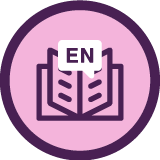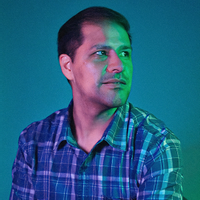Introduction
Basic concepts about grammar
Present tenses and the different information that can be transmitted with them.
Questions in present simple
Present simple for general states and descriptions
Present continuous: expressing lasting actions
Quiz: Present tenses and the different information that can be transmitted with them.
Past tenses and the differences among them.
Past simple: finished actions in past
Past continuous: ongoing actions that get interrupted
Quiz: Past tenses and the differences among them.
Talking about the future and constructions with Will.
Future simple with be + going to
Future simple with will
Conditional forms emphasizing type 1 (if + present simple, results with will, might, may)
Quiz: Talking about the future and constructions with Will.
To review the different forms of verbs (Regular, regular and non personal forms)
Regular and irregular verbs
Focus on present perfect for experiences
Present perfect continuous: structure and use
Past perfect: structure and use
Quiz: To review the different forms of verbs (Regular, regular and non personal forms)
Modal Verbs and Phrasal Modals: expressing obligation, prohibition and advice
Modal verbs for recommendations
Modal verbs for obligations
Phrasal modals: types and use
Quiz: Modal Verbs and Phrasal Modals: expressing obligation, prohibition and advice
Constructions with adjectives and prepositions: Comparisons and Phrasal Verbs
Adjective comparisons: as
Phrasal verbs: constructions and possibilities
Phrasal verbs: constructions and possibilities part 2
Quiz: Constructions with adjectives and prepositions: Comparisons and Phrasal Verbs
Emphasis on Past: Use of Past Modals and Past Habits
Past modals: should have
Past modals: would have
Past habits: used to
Past habits: would
Quiz: Emphasis on Past: Use of Past Modals and Past Habits
Conclusion
Summary and conclusions
Create your cover letter
Tell us what you learned in the course
No tienes acceso a esta clase
¡Continúa aprendiendo! Únete y comienza a potenciar tu carrera
Si ya tienes una cuenta,

Past modals: would have
21/26Recursos
Introductions constructions with would + present perfect forms to express changes in past actions forme one’s own perspective.
You can talk talk about regrets or advices in the past from your perspective. Using would, Tell us what would you have done in the situation provided.
Aportes 78
Preguntas 8
Ordenar por:
Would Have
Use would have to imagine a result (if something had been different in the past):
If you arrive late at the airport and miss your flight, you can say:
“If we had arrived earlier, we would have caught our flight.”
If you forget your umbrella, and it starts to rain, and you get wet, you can say:
“If I had brought my umbrella, I wouldn’t have gotten wet in the rain.”
Would have expresses more certainty about the result than could have:
“If I had worked harder, I could have gotten a promotion.”
(maybe I’d get a promotion… but maybe not)
On a test where you need 70% to pass:
“I got a 68 on the test. If I had gotten two more points, I would have passed.”
(with the two points, passing the test is CERTAIN)
If I had learned English before, I would have been the best QA.
If I had known about the importance of speaking English nowadays, I would have started to learn English since I was younger.
If i had moved to USA when I was 5 , I would have spoken english very well
If she knew he is a criminal, she wouldn’t have married him.
Past Modals: would have
–
You can express the wish for something different in the past. Also, you can express results for hypothetical situations in the past.
Introductions constructions with would + present perfect forms to express changes in past actions forme one’s own perspective.
–
Wish for something different in the past:
- I would’ve come earlier, but the traffic was horrible.
- She would’ve brought the book for you, but you didn’t tell her.
- We would’ve practiced yesterday, but the rain was too heavy.
Modals verbs have the characteristis that they affect the verb that follows them, so you’ll never going to use “has” for example.
–
Hypothetical situations in the past
- If I had known about the party, I would’ve invited some friends overs.
- If she had heard you when you talked about it, she would have been very angry.
You can talk talk about regrets or advices in the past from your perspective.
If I had known what I know today, I would’ve taken different decisions
Past Modals: Would Have
“You can express the wish for something different in the past. Also you can express results for hypothetical situations in the past”
- You can use this expression to express one situation that would be different in the past, and imagine what would be the results also in the past
WISH FOR SOMETHING DIFFERENT IN THE PAST
SUBJECT + WOULD + HAVE + PAST PARTICIPLE
-
I would have come earlier, but the traffic was horrible.
-
She would have brought the book for you, but you didn’t tell her.
-
We would have practiced yesterday, but the rain was too heavy.
HYPOTHETICAL SITUATION IN THE PAST
IF + PAST PERF + SUBJECT + WOULD HAVE + PAST PARTICIPLE
- If I had known about the party, I would have invited some friends over.
- If she had heard you when you talked about it, She would have been very angry.
If I had learned English in the past, I would have a better job.
If I had known about Platzi before, I would have learned english a long ago
I would have got a job in the technology industry, but I didn’t join Platzi before.
Excellent explanation, thank you teacher.
Past Modals, WOULD HAVE and SHOULD HAVE, both have the quality of expressing suggestions and recommendations in the present.
WOULD HAVE can also be used to express recommendations in the past, but also it can express hypothetical situations. Situations that would be different in the past and you imagine what would be the result, also in the past. So, if I had done this: what would have happened?
- Wish for something different in the past
STRUCTURE: subject + WOULD + HAVE + past participle.
The structure is quite straightforward and it follows the same rules as the previous one that we checked with SHOULD.
SHOULD HAVE is kind of like a recommendation, but you give it to yourself. So, always WOULD have that characteristic of talking about , like, introspective stuff.
You NEVER going to use HAS after WOULD (she would have brought the book). Because WOULD keeps the NEXT VERB from changing. So ALWAYS we’re going to use HAVE.
For example: I would have come earlier, but the traffic was horrible (you express your desire for that situation to be different). - Hypothetical situations in the past
STRUCTURE: If + past perfect + subject + WOULD HAVE + past participle.
We express a condition with past perfect, another of the structures that we checked in previous classes.
we express that situation that happened like this hypothetical situation (PAST PERFECT). And then with WOULD HAVE (the modal), we express the possibility, the possible outcome. What would have happened if the other condition had happened. You imagine, no?
For example: If she had heard you when you talked about it, she would have been very angry.
🤗😇
thanks
😇🤗
very good information
Thanks
hello
If you had watched the first season, you would have loved this one.
Past modals: would have Would Have
Use would have to imagine a result (if something had been different in the past):
If you arrive late at the airport and miss your flight, you can say:
“If we had arrived earlier, we would have caught our flight.”
If you forget your umbrella, and it starts to rain, and you get wet, you can say:
“If I had brought my umbrella, I wouldn’t have gotten wet in the rain.”
Would have expresses more certainty about the result than could have:
“If I had worked harder, I could have gotten a promotion.”
(maybe I’d get a promotion… but maybe not)
On a test where you need 70% to pass:
“I got a 68 on the test. If I had gotten two more points, I would have passed.”
(with the two points, passing the test is CERTAIN) Past Modals: would have
–
You can express the wish for something different in the past. Also, you can express results for hypothetical situations in the past.
Introductions constructions with would + present perfect forms to express changes in past actions forme one’s own perspective.
–
Wish for something different in the past:
I would’ve come earlier, but the traffic was horrible.
She would’ve brought the book for you, but you didn’t tell her.
We would’ve practiced yesterday, but the rain was too heavy.
Modals verbs have the characteristis that they affect the verb that follows them, so you’ll never going to use “has” for example.
–
Hypothetical situations in the past
If I had known about the party, I would’ve invited some friends overs.
If she had heard you when you talked about it, she would have been very angry.
You can talk talk about regrets or advices in the past from your perspectective
WOULD HAVE’
WISH FOR SOMETHING IN PAST
STRUCTURE
SUBJECT + WOULD + HAVE + PAST PARTICIPLE
EX:
- IF I HAVE DONE THIS, WHAT WOULD HAVE HAPPENED
- I WOULD HAVE COME EARLIER BUT TRAFFIC WAS HORRIBLE
- SHE WOULD HAVE BROUGHT THE BOOK, BUT YOU DIDN’T TELL HER BEFORE
- WE WOULD HAVE PRACTICED YESTERDAY, BUT THE RAIN WAS HEAVY
Should Have
Use should have to say that a different action was recommended in the past.
If you arrive late to English class, you can say:
“I should have left my house earlier.”
If you regret an argument, you can say:
“I shouldn’t have yelled at you yesterday. I’m sorry.”
You can also use should have / shouldn’t have to tell other people that a different action in the past would have been better. If your son fails a test, you can say:
“You should have studied. You shouldn’t have played video games all weekend.”
Could Have
Use could have to talk about possibilities if something had been different in the past.
For example, someone who didn’t go to college can say:
“If I had gone to college, I could have gotten a better job.”
When talking about a gymnast who didn’t win a competition, you can say:
“She could have won the gold medal if she hadn’t fallen three times.”
Could have is often used with “if + had + past participle” (If I had gone / if she hadn’t fallen) – these “if” phrases express the imaginary past situation. However, in some cases you can use could have without the “if” phrase. Imagine you’re driving with a person who makes a dangerous maneuver on the road. You can say:
“Are you crazy? We could have gotten into an accident.”
Would Have
Use would have to imagine a result (if something had been different in the past):
If you arrive late at the airport and miss your flight, you can say:
“If we had arrived earlier, we would have caught our flight.”
If you forget your umbrella, and it starts to rain, and you get wet, you can say:
“If I had brought my umbrella, I wouldn’t have gotten wet in the rain.”
Would have expresses more certainty about the result than could have:
“If I had worked harder, I could have gotten a promotion.”
(maybe I’d get a promotion… but maybe not)
Wish for something different in the past.
💡 Subject + Would + Have + Past Participle
- I would have come earlier, but the traffic was horrible.
- She would have brought the book for you, but you didn’t tell her.
- We would have practiced yesterday, but the rain was too heavy.
Hypothetical situations in the Past
💡 If + Past Perfect + Subject + Would Have + Past Participle
- If I had known about the party. I would have invited some friends over.
- If she had heard you when you talked about it, She would have been very angry.
If the weather had been good we would have gone to the park.
Past modals:would have
You can talk about regrets or advices in the past from your perspective. Using would, Tell us what would you have done in the situation provided.
- Should for recommendation / advice
“If you want to lose weight, you should eat healthy food.” - Could for possibilities
“I have the day off tomorrow.”
“Great! We could spend the day at the beach. Or we could go shopping.” - Would for imagining results
“If I were rich, I would buy a boat.”
Would have expresses more certainty about the result than could have:
“If I had worked harder, I could have gotten a promotion.”
(maybe I’d get a promotion… but maybe not)
On a test where you need 70% to pass:
“I got a 68 on the test. If I had gotten two more points, I would have passed.”
(with the two points, passing the test is CERTAIN)
- If I hadn’t heard about Platzi, I wouldn’t have learned so much in such a short period of time.
Nice class! N ever stop learning 😃
If I had had money, I would have studied in a university.
is like Hubiese
- if i had been there when he said that, i would had hit him
-If the school taught more creatively, the kids would haven´t hate it
If we had arrived earlier, we would have caught our flight.
I
If I had studied more English during this year, by now I would have become a C1 speaker.
If i took the time, i would learned English in platzi
If I had known about Platzi earlier, I would have subscribed a long time ago.
If I had passed the entrance exam, I would`t have met platzi.
I should recommend learning English at the Platzi English Academy, but you could take an expert platzi plan or you could take a simple course, if I had met you in 2017 I would never have recommended you because I didn’t know Platzi
If I had chosen another career, I would have taken another decisions.
or
If I had met Platzi earlier, I would have advanced proffesionally faster.
'WOULD HAVE’
WISH FOR SOMETHING IN PAST
STRUCTURE
SUBJECT + WOULD + HAVE + PAST PARTICIPLE
EX:
- IF I HAVE DONE THIS, WHAT WOULD HAVE HAPPENED
- I WOULD HAVE COME EARLIER BUT TRAFFIC WAS HORRIBLE
- SHE WOULD HAVE BROUGHT THE BOOK, BUT YOU DIDN’T TELL HER BEFORE
- WE WOULD HAVE PRACTICED YESTERDAY, BUT THE RAIN WAS HEAVY
HYPOTHETICAL SITUATIONS IN PAST
STRUCTURE:
IF + PAST PERF + SUBJECT + WOULD HAVE + PAST PARTICIPLE
EX:
- IF I HAD KNOWN ABOUT IT, I WOULD HAVE TOLD YOU
- IF SHE HAD HEARD YOU BEFORE, SHE WOULD HAVE BEEN ANGRY NOW
- IF THEY HAD EATEN, YOU WOULD HAVEN’T PREPARED FOOD
I would have studied medicine, but the price of that career is too expensive.
If I had studied medicine I would have worked at a hospital.
Thank for the explanation teacher Andrés, you explain the courses very easy to understand how use the gramatics of the english and how to talk correctly.
Thank you
thank you
If I had learned English before, now I would have been a remote worker.
If I had known about English courses in Platzi, I would have started before.
I would have called yesterday, but I had a lot of meetings.
This video is of Pacho Ochoa and could help us to complement this class:
https://youtu.be/ZzZxjFg_PmA
I would have finished this course, but I was very busy with my work
If I have studied English in high school, I would have been bilingual in the university.
Explanation
if i had more loved I would one girlfriend.
If he had been born in another country, he wouldn’t have studied lawyer
Past Modals: Should Have
Structure = Subject + Should + Have + Past Participle
- When I was in high school, I should have studied harder.
- You shouldn’t have waited so long to talk about your plans with your family.
- Bob Should have prepared better for the exam, he failed.
Past Modals: Would Have
Structure = Subject + Would + Have + Past Participle - I would have come earlier, but the traffic was terrible.
- She would have brought the book for you, but you didn’t tell her.
- We would have practiced yesterday, but the rain was too heavy.
So let’s look at one of the qualities of “would have” because, of course, it can also be used to express recommendations in the past but it can also express hypothetical situations, so let’s see how that works.
Ok, sure we expressed a wish for a different outcome in the past and hypothetical situation.
we can see how we can express recommendations, how we can talk about hypothetical situations.
Recommendations or your desire to express something different in the past. The structure is quite simple and follows the same rules as the one we had seen previously with “should”. Would + have + past participle.
I would have come earlier but the traffic was horrible. You express the wish that that situation were different, but in that particular context, there was something that stopped you from fulfilling your promise or achieving that goal in the past. "I would have come earlier but the traffic is disastrous here, that’s why I was late.
Would always have that characteristic of talking about introspective things. Next example, “she would have brought you the book, but she didn’t tell her.” If I had done this, the result would have been that of her bringing you the book. But you did not.
Another example, “we would have practiced yesterday but the rain was very heavy.” Again, you wish something had been different. You wish they could have practiced yesterday but there was a situation that did not allow you to do this particular activity.
So “would have” plus the past participle expresses a desire to change a situation, an event, an action in the past. One note here is that we must pay attention that “have” is the auxiliary verb that we will always use.
Modal verbs have the property that they do not affect the verb that follows them so you will never, never, never use “has” afterwards.
Remember that all this deals with unreal situations, things that did not happen. But imagine, what could have happened if …?
If you had chosen a different career, you were working in a different country, it is likely. Or I would have graduated later, it may be a possibility.
The good thing about this is that you can see how all those sentences and all the constructions that we learned in previous classes come together to form more and more elements of complex language, they combine different sentences with different qualities and together they are able to create meaning. And they will give you more tools to express yourself with more complex information.
Hypothetical situations
I would have traveled abroad but I am very attached to my family.
I would have supported my mother but I was very busy with my job.
If I would have spent more time with my mother she would have been very happy.
If I had buyed bitcoin…
If I had have a credit card in 2009, I would have bought bitcoins.
I would have studied english before traveled to USA if I had planned to get a new job.
I would have went to dentist to not lost the tooth.
I would have stayed with you but my parents needed to me in my house
If I had known about her situation I would have helped to her
Hypothetical situations in the past
Wish for something different in the past
I think “would have” is uses like the Spanish expression “hubiera”
The “would have” isn’t exist XD
I would have gone to live abroad last year, Now we have the pandemic
Would Have
Use would have to imagine a result (if something had been different in the past):
If you arrive late at the airport and miss your flight, you can say:
“If we had arrived earlier, we would have caught our flight.”
If you forget your umbrella, and it starts to rain, and you get wet, you can say:
“If I had brought my umbrella, I wouldn’t have gotten wet in the rain.”
Would have expresses more certainty about the result than could have:
“If I had worked harder, I could have gotten a promotion.”
(maybe I’d get a promotion… but maybe not)
On a test where you need 70% to pass:
“I got a 68 on the test. If I had gotten two more points, I would have passed.”
(with the two points, passing the test is CERTAIN)
If I had bought her flowers…
If I had held her hand…
If I had given her all my hours
when I had the chance…
If I had taken her to every party
’Cause I remember how much she loved to dance,
She wouldn’t have been dancing with another man… 😦
If I had known about the city, I would have visitied a lot of time.
Some examples:
If you have started before, you would have been a senior today.
She would have accepted a date with you, if you have been nicer!
Would your parents have punished you if they have realized you weren’t there?
If i had known about the covid I would have learnned coding before.
As same as “should have”, we can also use “would have”, but this one also can be used for hypothetical situations, the conditional is an important part of this, it says, what could be happened if some action were done
If I had noticed that they were cheating, I would have said something.
Thanks. I liked the uses of hypothetical situations.
If I had known the covid -19, I would have traveled before




























































¿Quieres ver más aportes, preguntas y respuestas de la comunidad?